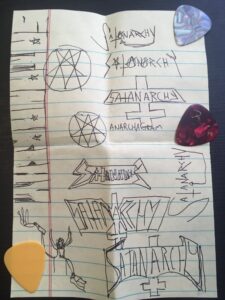 “Full of rage and fury and hate
“Full of rage and fury and hate
Here to obliterate your church and state
Down with the government so we can be free
We are Satanarchy!”
With that immortal incantation, the Reverend Davey Wicked ushered in the dawn of a new musical age. The reign of Satanarchy had begun and the landscape of punk rock was irrevocably changed forever. The faces of the Reverend Davey Wicked, Cody Iscariot and Neville were chiseled into the summit of Mount Rock, and Satanarchy passed on into legend.
My first musical love has always been heavy metal, a genre often associated with lyrics about Satan and anti-religion. However, I left metal behind in my college years to dive deep into the world of punk rock and toyed with the idea of combining metal’s satanic lyrics with the punchy aggression of punk. Indeed, modern satanism promoted by the Satanic Temple has nothing to do with devil worship of any sort. Instead, they’re a secular organization concerned with promoting human rights and social justice, topics that are ideologically aligned with the punk rock ethos. Merging the two worlds had the potential to be an interesting combination of genres. In 2015, I pitched my idea to my friends Cody and Keenan, who I had previously played with in a band during high school, and thus, Satanarchy was born.
After a few meetings discussing the general direction and concept of the project, writing and recording began in July 2016. We converted the living room of Cody’s one-bedroom apartment into a makeshift studio for the next month and set to work. Cody and Keenan collaborated on the music for guitar/bass and drums, respectively. Meanwhile, I worked on fine-tuning lyrics and vocal melodies to fit their music. Songs were often written and recorded in the same session, generally within a few takes. When it came to the matter of stage names, I donned the title of “The Reverend Davey Wicked,” Cody named himself “Cody Iscariot,” and Keenan went with the darkly ominous moniker “Neville.” After a few recording sessions, we emerged from the studio with our debut album, Obliteration of Church and State.
The album itself is a 17-minute long hodgepodge of influences distilled into 11 songs. We called on punk bands like the Misfits, the Ramones, the Clash and Green Day for inspiration. You can hear it on songs like “God Hates Punk Rock,” a personal favorite of mine. It’s a minute-long punk barrage with expletive-laden lyrics about rebelling against authority in the name of rock and roll.
As our sessions continued, we became more comfortable with exploring different sounds and ideas. This resulted in songs like “Angel in White,” our nod to horror punk and heavy metal, featuring a bridge section of funeral dirge guitar riffs that would make Black Sabbath proud and a shredding guitar solo that recalls the best solos of 80s metal legends. Other creative moments include Cody’s hilarious guitar solo to “Snorting Pixie Stix,” my ode to grade school mischief. He recorded it himself in between sessions and intentionally flubbed the notes, causing me and Keenan to burst into laughter when he showed us the recording.
Despite my original plan to combine anarchistic punk with satanic metal, the project’s lyrics took a goofier turn as the writing sessions wore on. As such, none of the politically themed songs managed to merge anarchism and satanism as well as “Red, White, and Blue.” The lyrics attribute the colors red, white, and blue to various injustices throughout American history:
“Red stripes ripped across the backs of the slaves
White for the cotton, the lives that it takes
Blue are the bodies, from the trees they sway
Red, white, and blue built the Confederate plague”
The song ends with an appropriately satanic twist on the theme, as satan arises from hell to force America to reckon with its sins. Musically, it’s a mid-paced stomper anchored by Keenan’s deceptively simplistic marching drumbeat, which builds in complexity over the course of the song.
This leads me to the two best songs on the record, the first being “Brothers in Satan.” It’s simple, straightforward pop-punk, anchored with a bouncy bassline provided by Cody. The song is a tribute to our fictional fourth member, Kevin. The idea came to us early in the project’s conception, and we built up a small mythology around him: he was our electric triangle player who died from an electrocution accident. We added backing harmonies to the chorus and Keenan performed an extended keyboard outro, featuring even more vocal harmonies. It’s simultaneously the silliest and most genuine moment on the album.
My other favorite song is “That’s What Satanarchy Means To Me.” I came up with the idea of abandoning punk completely to write an overly sentimental patriotic ballad in the vein of Lee Greenwood’s “God Bless the U.S.A.” Lyrically, I revisited the anarchist and satanic themes, but in a much more satirical and tongue-in-cheek manner than the comparatively serious “Red, White, and Blue.” The lyrics detail a revolution to abolish government corruption and install a Satanic regime in its place, featuring heartwarming and wholesome lyrics such as:
“From the mountains of Appalachia
To the streets of L.A.
I hear America’s unholy chanting
Each and every day
A song for every generation
To lock arms and sing as one
As Beelzebub arises from Hell
And darkness blots out the sun”
If any song on this album seemingly wrote itself, it was this one. By the time I had written the first verse, Cody found a chord progression, and the song was laid to tape soon after. We added a few more instrumental flourishes to give the song a grandiose sense of pathos, including a sweet melodica solo from Keenan and a soulful guitar solo from Cody.
During the writing and recording process, we talked about a hypothetical future for the band. I had begun writing lyrics for a second album, intending to take the anarchist and satanic themes more seriously to address issues such as police brutality, white supremacy, and religious corruption. A third album would’ve been an indulgent rock opera, telling the story of our music inspiring a revolution against a dystopian American theocracy in the distant future of 2666. We never made concrete plans to take our project to a live setting, but I hoped that we could play shows one day. Sadly, the future of Satanarchy wouldn’t come to pass. We quietly uploaded the album online and told a few of our friends about it. We hoped to eventually do a full-blown album release, but we soon turned our focus to other creative projects. Soon after we drifted apart and all efforts to continue the project were forgotten.
For any foolhardy readers who choose to scour the internet for Satanarchy’s Obliteration of Church and State, I’ll warn you that it’s juvenile, vulgar, crass, and unpolished in more ways than one (also, if you come across an album called Disgraceful World by Satanarchy, that’s a Swedish metal band who I was heartbroken to discover had stolen my extremely clever band name about 15 years before I thought of it). While the album was clearly our best-sounding and performed musical project at that time, our recording setup was pretty crude and some moments on the record feel sloppy. Speaking for myself, I had no confidence while singing in a recording setting. My flat, pitchy, and awkward vocals throughout the album are evidence of that. I don’t know if I can safely tell you that it’s a “good” album, but I can promise that it’s full of passion, raw and unrefined though that passion may often be. It’s the expression of three young adults trying desperately to hold on to the last vestiges of childhood, gripping a guitar with one hand and raising a middle finger with the other. I certainly have been involved with artistic projects that are technically better quality, or thematically richer in content, but that album is undoubtedly my favorite artistic project I’ve helped to create. To me, it’s unpretentious, uncompromising, and a wholly pure example of artistic expression. To put it simply, it embodies the spirit of rock and roll. I’ll always be proud of it.
Satanarchy is dead. Long live Satanarchy.

